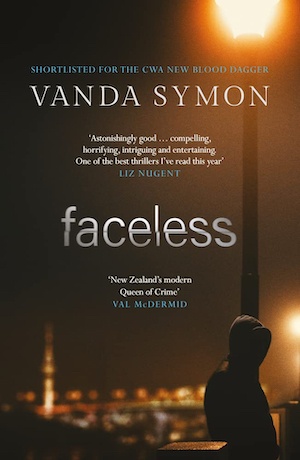In New Zealand author Vanda Symon’s new stand-alone crime novel, Faceless, an impulsive decision escalates into a violent situation. Two worlds collide one night when Bradley, an overworked and repressed office worker picks up Billy, a Fijian street worker, on the notorious K Road in Auckland.
The 18-year-old Billy only turns tricks to have enough money for food and art supplies. She dreams of something bigger, but for now, she has her art and the support of her homeless friend, Max.
Bradley wants to blow off steam after a stressful day at work where he’s been ordered around by his obnoxious and demanding boss. Initially Bradley is the stereotypical doormat. He endures the late, unreasonable hours and meekly accepts the scrutiny of his domineering wife in whose eyes he can never do any good. But his pent-up frustration has to be released. Some people go to the gym to work off their frustrations; Bradley decides to pick up a prostitute. Being an inexperienced kerb cruiser the incident doesn’t go as smoothly as he hoped it would. Angry at himself and convinced that Billy sniggered at his inadequacy, he attacks her setting in motion a chain of shocking events.
Bradley takes Billy to one of his properties, a remote warehouse. He has no plan and merely acted on impulse, but as time progresses, he enjoys this new-found power over a vulnerable, exposed woman. Suddenly he has more confidence, no longer feels inadequate and for once, he calls the shots, not his boss or his wife. It’s at this point that meek and mild Bradley turns into a vile and despicable character. It’s obvious that he is only looking for an excuse to act violently and he revels in his power to torture and harm Billy repeatedly. He also firmly puts any blame onto her.
To add insult to injury, this isn’t the first time Billy has been abused. As a teenager she was thrown out of her parents’ house despite her father being a preacher. Since Billy is one of the three main characters, the novel would have benefitted from a more textured back story. The cruel treatment by her parents is mentioned and her father’s violence is hinted at, but more detail would’ve fleshed out the character, eliciting greater sympathy.
The story is told by three narrators: Bradley, Billy and Max. Bradley and Billy’s sections are particularly gruelling to read. Billy’s point of view is chilling and the level of fear is tangible in her descriptions of Bradley’s actions and her desperation to find a way out of the situation. Violence against women in crime fiction novels is nothing new, but the level of misogyny and abuse will shock even the toughest reader. It’s not necessarily the graphic descriptions, but rather the frequent sexual references in Bradley’s inner dialogue and his observations of female characters. Experiencing these repetitive thoughts of violence and sex through Bradley’s twisted mind is tough to endure and borders on gratuitous. Of course, the whole point is to highlight misogyny, but repeating the same thoughts feels counterproductive. Bradley’s sadistic actions on their own get the message across effectively. The fact that this violence is also a sexual turn-on makes for particularly unsettling reading.
While Billy is imprisoned and abused by Bradley, her friend Max suspects she has come in harm’s way. They shared a sleeping space in an alley and Billy always let Max know when she would be away. Max’s pleas to the police initially fall on deaf ears and he isn’t taken seriously due to his odious appearance and pungent odour.
Eventually he convinces Meredith, a detective he knows from his past, to take him seriously. Even Meredith is shocked at his decline and promptly orders him to clean himself up. Fortunately, this is just the kick up the backside Max needs to get his life back on track. We also establish that Max’s homeless situation was caused by a traumatic event, the details of which are revealed later. The better and improved Max joins forces with his estranged son, Harry, to track down Billy. But will they be able to get to her in time?
The first three-quarters of the novel unfold fairly slowly and it’s brimming with details of Billy’s abuse and horrific circumstances, as well as Bradley’s inner dialogue which mainly consists of his repetitive, almost obsessive thoughts about sex, women and his power. More than once he refers to himself as a “new and improved being, a creation of power, a superman, a god” and how alive and virile he’s feeling. At times he acts like a superficial, almost cartoonish villain instead of an ordinary man with issues. The pace only picks up in the last third of the novel and readers will have to be patient for some action. However, there’s no shortage of tension and suspense from page one.
Faceless conjures up an unsettling and upsetting situation of violence against women, often, and in this case, the direct result of severe toxic masculinity. It highlights the plight of the faceless, silent female victims and the overlooked men and women who live on the streets, ignored and often despised. Lastly, and no less importantly, it’s a reminder of the urgency need for mental health support. The depiction of both these extremely relevant topics are where the novel’s strength lies.
Faceless is much darker than Symon’s Sam Shephard series. There is no trace of wit; no lighter moments. These are serious topics delivered in a gut-punching way. Brace yourself for an uncomfortable read.
You can read our other reviews of Vanda Symon’s books here.
Orenda Books
Print/Kindle/iBook
£4.27
CFL Rating: 3 Stars
